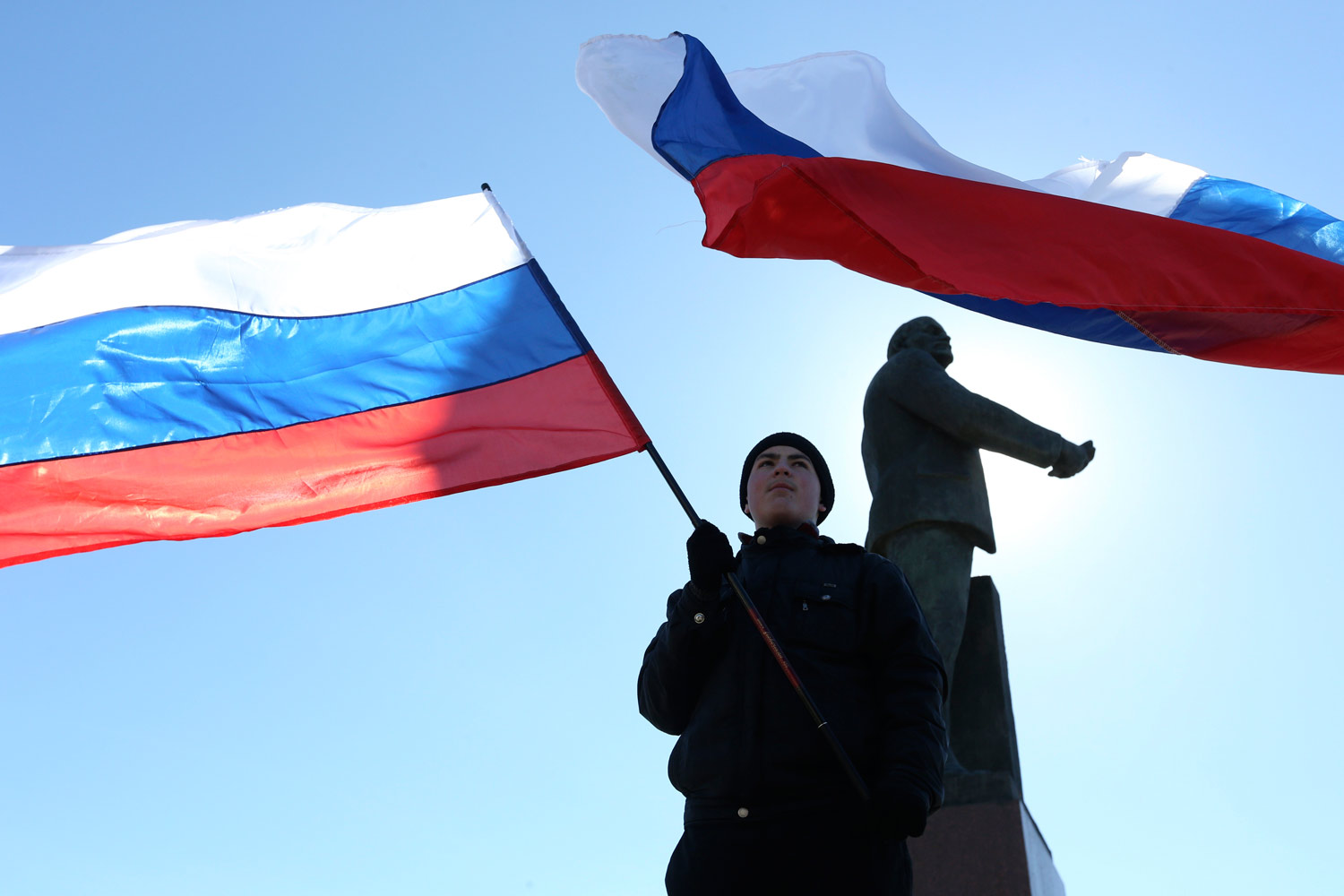Bellicose posturing could lead to disaster. The only way out is through diplomacy.
The Editors
(Reuters/Sergei Karpukhin)
The unnecessary confrontation over Ukraine has not only restored the Cold War between the West and Russia, but has done so in an exceedingly dangerous form. The epicenter is no longer in Berlin; it’s on Russia’s borders—with official rhetoric and military gestures on both sides approaching something like the Cuban missile crisis of 1962.
The urgent issue today is to stop the drift toward hot war. Yes, Vladimir Putin’s annexation of Crimea trespasses on international law, though it is difficult to bear US officials’ invocation of a principle that Washington itself has often violated (see, most recently, Kosovo and Iraq, the latter now marking the eleventh anniversary of an illegal US invasion and occupation). Financial and visa sanctions, while inflicting a cost on Russia, will not deter Moscow. As Putin argued in his March 18 speech before the Russian Federal Assembly, Russia feels “cornered” and has been repeatedly “deceived” by the West—particularly Washington—since the Soviet Union broke apart more than two decades ago, especially in light of the expansion of NATO to its borders.
The only way out, the only possible return to stability and cooperation in East-West relations, is through diplomacy and negotiations. For this to happen, Washington and Moscow must recognize that the other side has legitimate grievances and interests. Certainly this must be acknowledged in Washington, where such admissions are hardly ever made.
Instead, Senator John McCain, his Democratic colleague Dick Durbin and an assemblage of politicians from both parties are recklessly stoking the flames of folly. They’ve demanded that the United States arm the new government in Kiev, with McCain calling for installation of missile-defense systems in Poland and the Czech Republic. Such bellicosity appeases the hawks at home but enrages the war party in Moscow, which is urging the Russian president to resist caving in to the West.
Amid hysterical talk from frustrated Cold Warriors like McCain, Helmut Kohl, the father of the reunified Germany, admitted that there have been “great omissions” in European Union policy toward Ukraine. He noted a “lack of sensitivity” in the EU’s relations with Putin and Russia, warning against a reckless call to arms.
In such a charged environment, it’s all the more important to pay close attention to diplomatic initiatives, even if they come from the Kremlin. While it may not be an ideal solution, there is merit in the Russian foreign ministry’s “road map” calling for establishing an international support group—with the EU, United States and Russia as members—to help Ukraine stabilize itself. Among other crucial points, the proposal calls for a Ukrainian national assembly to draft a constitution that would create a new federal system in which regions would have a reasonable degree of autonomy, confirm Russian as a second official language and, critically, uphold Ukraine’s military and political nonalignment—that is, maintain Ukraine’s geopolitical independence from Russia as well as the West, which will require an end to NATO expansion.
A settlement is possible if all countries’ security interests are taken into account. This would mean that Ukraine would hold elections with participation and guaranteed protection for ethnic Russians; would have a nonaligned government (stripped of neofascists); would pledge never to join NATO; and would develop economic relations with Russia and the EU (unavoidable if Ukraine is to survive economically).
It is a good sign that the Kiev government appears ready to heed common sense. Acting Prime Minister Arseniy Yatsenyuk, who visited the White House, said on March 18—in comments designed to reassure Russia and Ukraine’s large population of ethnic Russians—that the country will not seek NATO membership and that decentralization of state power is a key plank of the interim government’s platform.
There is also good reason to think Putin—who emphasized that Russia has no designs on other regions of Ukraine—is ready to negotiate. A successful outcome could include Moscow’s recognition of a legitimate Kiev government; demobilization of troops; resumption of gas discounts as well as favorable trade relations to prevent Ukraine’s economic collapse; and perhaps even establishing a special relationship between Crimea, now annexed by Russia, and Ukraine (though, of course, without affecting Russia’s naval base at Sevastopol).
Even more is at stake in this profound crisis. Washington needs Russia’s cooperation in addressing global and regional issues such as the Syrian civil war, now in its third year; negotiations with Iran; exiting Afghanistan; the fight against Al Qaeda and other terrorists; relations with China; and managing North Korea.
We cannot afford a new Cold War. This crisis must not be framed as a US-Russia showdown or as a question of American “weakness” or “fecklessness.” Resolution will demand leadership on both sides. Obama and Putin must transcend their respective war parties and hardliners at home—as Ronald Reagan did, from 1985 to 1988, when he met Mikhail Gorbachev halfway—and provide real leadership so that a broad, pluralistic and democratic center in Ukraine emerges that is committed to establishing a new constitutional order: one that is capable of reconciling the interests and concerns of all parts of that country.
The Editors